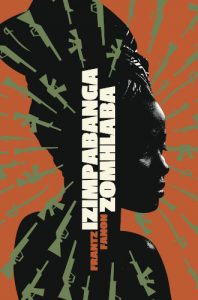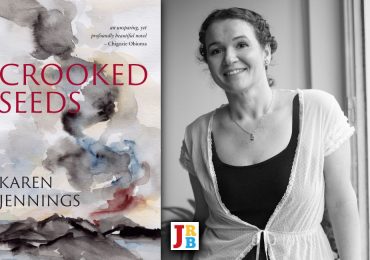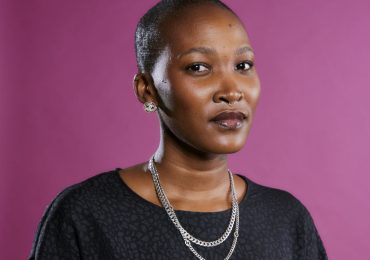Udliwano ndlebe mayelana nokuhushushwa kwengcwadi ka Frantz Fanon, Izimpabanga Zomhlaba, phakathi komhumushi uMakhosazana Xaba no Musawenkosi Cabe.
This is a conversation on the isiZulu translation of Frantz Fanon’s The Wretched of the Earth between the translator, Makhosazana Xaba, and Musawenkosi Cabe.

Izimpabanga Zomhlaba
Frantz Fanon (translated into isiZulu by Makhosazana Xaba)
Inkani Books, 2024
Musawenkosi Cabe for The JRB: Nonkosi, ngiyathokoza kakhulu ngokwamukela kwakho isicelo sami, ngibonga kakhulu nangesikhathi sakho nangomsebenzi omuhle owenzile wokuhumusha incwadi ka Frantz Fanon. Usenze abantu, siya kuhalalisela!
Ngamafuphi, can you please share the initial process of how you got involved in the translation of The Wretched of the Earth? What were your initial thoughts or feelings, and what ultimately convinced you that this was a project worth pursuing?
Makhosazana Xaba: Ngiyabonga nami Musawenkosi. Kuyangithokozisa ukukuzwa uthi, ‘Usenze abantu’.
The three criteria that the translation was meant to meet, as shared with me by Mwelela Cele and Nontobeko Hlela from Tricontinental, are what convinced me that I could do the work. I was also impressed by the fact that they had taken the trouble to think the process through.
The three criteria were: experience in political activism, being a poet and having training and experience in health (psychiatry as a bonus). In fact, listening to them spell out the criteria felt so surreal, ngavele ngaphelelwa. Ngenkathi uMwelela ekhuluma nami ocingweni ethi masihlangane sizokhuluma loludaba lokuhumusha, ngaya emhlanganweni ngazi kahle ukuthi ngizothi cha, akuwona owami lomsebenzi.
How serendipitous it was, then, that when Mwelela was speaking to his colleague—my daughter Nala—about the criteria, she was able to point out that I happen to meet all three! I do not know how many other potential translators were approached before they reached out to me. And I do not know of anyone else, yet, who meets these criteria.
The JRB: In reflecting on the criteria that were proposed to you by Mwelela Cele and Nontobeko Hlela, on behalf of the publisher, and why this aspect of the project was important to you in taking on the work of ukuhumusha/translation, how did you bring your knowledge and lived experience to the process?
Makhosazana Xaba: Naturally, is the first word that comes to mind. One’s lived experience and knowledge live side by side to inform any intellectual labour. What I kept wishing was that I had the experience of translating a written text from English into isiZulu. Instead, my lived experience and knowledge is the ability to translate in my head, when I am in conversation with people, from isiZulu to English.
The JRB: How would you describe the feeling when you finally held a copy of Izimpabanga Zomhlaba in your hands?
Makhosazana Xaba: I can still see myself flipping through the pages in complete shock. Seeing these many words I had worked on over and over again, now in a real book, was just something else. There was an indescribable surrealness as I looked at the pages!
The JRB: Fanon’s work, especially The Wretched of the Earth, is deeply rooted in radical humanism and the emancipatory forms of politics that recognise and even insist on people’s urgency to act collectively and as equals in pursuit of their struggle for liberation. This central theme, however, gets lost in contestations around the correct interpretation of Fanon’s ideas, such as debates over the title of the book: The Wretched of the Earth versus Damned of the Earth. In making meaning of the text, did you encounter these contestations, and how did you manage them in your process of ukuhumusha and ensuring that you capture Fanon’s message?
Makhosazana Xaba: Yes, I encountered these disputes. I made reading an integral part of my daily translation routine. I began each day with two hours of reading and then used the remaining six hours to work on the translation. The contestations that surprised me the most involved the first chapter, ‘Mayelana nodlame’. Reading about these contestations led me to reread Fanon in the original many times, so that I could sharpen my own understanding of him.
Rereading as a process is powerful in facilitating understanding and clarity. I do this a lot with poetry. So, when I was translating, I would mark the paragraphs that I needed to reread, insert a date, and then skip forward and continue translating. I would then return some days later. I did this so many times that I am embarrassed to admit that the editors spotted one paragraph I had forgotten to return to. I had great editors in DBZ Ntuli and Nakanjani Sibiya.
The JRB: How helpful was isiZulu in translating Fanon’s long sentences and gendered words like ‘mankind’?
Makhosazana Xaba: I don’t think I would use the word ‘helpful’. It felt challenging. The gendered words were a breeze to work with, because isiZulu is different. In the concluding chapter of The Wretched of the Earth there are so many references to ‘man’ so, I used ‘umuntu’ throughout. When Fanon says, ‘Come brothers’, my translation is ‘Wozani zingane zakwethu’. The back translation of ‘Wozani zingane zakwethu’ would be ‘Come, siblings’. The endearment that the word ‘brothers’ captures in this context is also captured fully by this expression—without excluding the ‘sisters’. I was deliberate about not translating word for word, because ‘Wozani bafowethu’ wouldn’t have worked!
The JRB: The opening chapter of the book, ‘Mayelana nodlame’/‘Concerning Violence’, begins with what the scholar Ato Sekyi-Otu, author of Fanon’s Dialectic of Experience, calls, ‘an unforgettable image of the revolution as a cataclysmic event’. Interlocutors of Fanon in postcolonial studies tend to focus narrowly on this chapter—with some reading Fanon as a ‘proponent of violence’. What do you make of this reading, and what was your overall impression of the book in this context?
Makhosazana Xaba: I think anyone who reads Fanon as a proponent of violence is either innocently misreading him or is in denial about the extreme, unmitigated and multifaceted violence of colonialism, including the apartheid version of it. Most likely it would be someone who has never lived as a ‘colonised person’.
Apartheid was declared ‘a crime against humanity’ by the United Nations (UN). The UN was only formed in 1945, after World War II. The Berlin Conference of 1884, which formalised colonialism, in fact formalised an unmitigated violence against people, because slavery had run its course. This unambiguous historical violence, which had been going on for centuries, was merely changing its form and focus. That said, the reading of Fanon as a ‘proponent of violence’ is not something I am interested in wasting my time analysing. My activism in the nineteen-eighties taught me that it is not enough to be non-violent. In my opinion, colonialism was a violent crime against humanity. It was never declared as such by its perpetrators. How could they?
The JRB: Ngicela usakhele isithombe ngokwenzile ukuzulungiselela ukuhumusha lencwadi?
Makhosazana Xaba: Okokuqala nje okwakubalulekile kimi ukuthi ngazi ukuthi kuzongithatha isikhathi esingakanani ukwenza lomsebenzi. Savumelana noNdosi benoHlela ukuthi ngizokwenza ucwaningo, ngihumushe inyanga yonke ngibheke isikhathi khona ngizokwazi ukuthi incwadi isiyonke ingangithatha esingakanani isikhathi.
Njengomuntu owayengakaze ahumushe lutho ngangingazi lutho ngesimo salomsebenzi la eMzansi, ngakho kwabaluleka ukuthi ngizifundise ngalesisimo, ukuze ngazi kabanzi.
Kunezincwadi ezine zakudala engingakaze nje ngihlukane nazo. Injula nokujiya kwesiZulu ka OL Shange eyashicilelwa okokuqala ngonyaka we-1953 engaqala ukuyifunda kwaform 1. Inzululwane eyabhalwa uJohn Charles Dlamini (uBulima Ngiyeke) incwadi yezinkondlo esayifundiswa ngikwa form 4 eyashicilelwa ngonyaka we-1957. Yona ngaqala ukuyifunda ngowe 1971. Eyesithathu Inqolobane yesizwe ka Sibusiso Nyembezi beno OEH Nxumalo eyashicilelwa ngonyaka we-1966.Incwadi Kusadliwa Ngoludala ka CT Msimang yashicilelwa ngonyaka we-1975. Kulezizozine Inqolobane Yesizwe kanye neNzululwane yizo nje engahlala ngibuyela kuzo selokhu ngaqeda isikole, indlela nje ezangithinta ngayo ngisewumfundi. Ngazikhipha ke zozine ngazibeka eduzane ngasebenza nazo kuko konke ukuhumusha kwami. Zaphenduka zaba abaphelezeli bami.
Ngoba ngaba nesidingo sokufunda izincwadi ezibhekene ngqo nokuhumusha ngahamba ngayofuna ezitolo ukuthi ngingatholani. Ilapho ngathenga khona incwadi ka Phindile Dlamini okuthiwa i-Avoiding Potholes in Translation: A Practical Perspective on Translation between English and isiZulu ephume ngonyaka we-2021, kanye neka AM Maphumulo okuthiwa Ukuvamisa Imithetho Yokubhala Nobhalomagama LwesiZulu Lonyaka Wezi-2021.
I have always loved dictionaries, so I have many of those moving between the two languages that I used often. A friend, Vossie Goosen, who is a psychologist, gave me a printed version—297 pages—of The Language of Pyscho-Analysis, translated by Donald Nicholson, which became very useful in understanding the description of the conditions mentioned in the fifth chapter, ‘Colonial War and Mental Disorders’.
Kunezincwadi ke eziningi eziqondene ngqo nempilo, imibono kanye nemibhalo kaFanon engangizifunda zonke izinsuku ekuseni ngaphambi kokuthi ngiqale ukuhumusha. Ngangikhetha nje ukuthi iyiphi incwadi, nasiphi isahluko engizosifunda ngoba ngihumusha siphi isahluko. Zonke lezi zibhalwe ngesiNgisi.
The JRB: Yiziphi izinto ongazibalula ezibe yizinqinamba ekuhumusheni Izimpabanga Zomhlaba? Yize bekunzingqinamba, yini ebeyikukhuthaza ukuthi ungapheli amandla?
Makhosazana Xaba: Ingqinamba yokuqala nje eyangimangalisa futhi yangidumaza ukuthi ama-academics emanyuvesi amaningana engazama ukukhuluma nawo ikakhulukazi laba abasezifundweni zokuhumusha nezezilimi babengakhululeki uma ngibuza imibuzo. Ngabe sengithi hhay isikhathi sibi vele ngoba sasesingene shi ezikhathini zeCovid. Lokhu kukhuluma nabantu ngama-emeyli akufani nokungqongqoza emnyango ubukane nomuntu amehlo namehlo.
Ama-term bank engakwazi ukuwathola ayengenakho lokukugxila kanye nokujula engangikulindele. Yebo khona ngasizakala lapha nalaphaya.
Babili abantu engangibathinta ngocingo uma ngidinga usizo ngokuhumusha igama, udadewethu ongelamayo uNomvula noNakanjani Sibiya. Angive ngabonga zingane zakwethu!
Okwenza ngingapheli amandla nakho kuningana. Okokuqala nje angikholwa ukuthi kukhona into engiyithanda njengokufunda izincwadi. Lomsebenzi wokuhumusha wanginikeza amathuba amaningi okufunda njengoba sengichazile ngenhla. Okwesibili, ngingumuntu oyithandayo inselelo. Iyangijabulisa kabi kabi. Okwesithathu kuyangijabulisa ukufunda izinto ezintsha. Kuningi kabi engangingakwazi ngaphambi kokuqala lomsebenzi. Ngangizwa kahle ukuthi ukuhumusha kuyangikhulisa, kungisabalalisela ingqondo. Nanokuthi ke ngakhethwa. Ngaqokwa eningini. Kwakungijabulisa ukuzikhumbuza lokho ngoba kwakungenza ngizimisele nangezinsuku engangingenamandla ngazo. Ngamalanga anzima kakhulu kwakungisiza ukuzikhumbuza ukuthi ngenza umsebenzi obalulekile, ozoba isibonelo sekusasa, isibonelo sesizukulwane esilandelayo. Futhi ke ngiwumuntu okuthandayo ukuxazulula izinkinga, kuyangijabulisa.
The JRB: Ngemvume yakho Shwabade, ngaphambi kokuthi ngikubuze lombuzo, ngizocaphuna umusho ekhasini lesishagalombini kwi Zimpabanga Zomhlaba, ‘Kubantu abakholonayiziwe okuyigugu kunakho konke kubo, ngoba kuyimfuneko nqala: umhlaba; umhlaba ozobanika ukudla, futhi okubaluleke okukwedlula konke, isithunzi’. Ngiyayithanda indlela ohumushe ngayo, ukwenza isibonelo kumbhalo wesiNgisi kusetshenziswe igama noma isingathekiso ‘bread’ – uma uhumusha ngqo okanye wenza idirect translation, usebenzisa igama elithi isinkwa, ngowami umbono, ukubaluleka komhlaba akuveli kahle hle. Igama elithi ‘ukudla’ likuveza kangcono lokho okushiwo ngu Fanon ngomhlaba. Kuthini okwakho ukuphawula ngalokhu?
Makhosazana Xaba: Kuyangithokozisa ukuzwa ukuthi siyavumelana. Lokhu okubonisayo kungenye yezinto engangiqaphelisisa ukuthi ngizenza kahle. Enye into engangihlala ngizikhumbuza yona ukuthi isiNgisi sinezindlela zaso sokukhuluma nokubhala. Lesi siboniso nje ‘putting bread on the table’ umsuka waso usezimpilweni zabantu abaqhelelene nomhlaba. Uma unomhlaba ukudla kwakho kuphuma esivandeni sakho kuye ngqo emlonyeni, okunye kudlula emlilweni. Noma ungenayo imali uzibona ungahluphekile, uma unesivande awulambi ngoba uzozitshalela ukudla kwakho udle usuthe.
Yiyo kanye ke lento esibuyisela kulenkulumo yodlame lokubuswa ngabezizwe. Uma ngifunda ngama ‘forced removals’ e-apartheid nje, mina ngiyaye ngicabange ukuthi ingabe lezizizumbulu zabantu abahlukunyezwa ngalenhlobo yodlame bakhuluma bathini ngalo? Kulula ukukhuluma ngodlame lwamaphoyisa e-apartheid ehlomile edubula abantu abangahlomile. Udlame okwantshontshwa ngalo umhlaba sebephendula ukweba bekwenza umthetho ngonyaka we 1913 bebeka iNatives Land Act, udlame oloyi crime against humanity.
The JRB: Kubafundi besiZulu, abangawujwayele umsebenzi ka Fanon, yimaphi amazwi ongabanika wona okubakhuthaza ekutheni lencwadi, Izimpabanga Zomhlaba bayithole futhi bathakasele ukuyifunda?
Makhosazana Xaba: Ngingathi nje uma ungenaso isikhathi sokufunda incwadi yonke, funda nje isiphetho. Ungasifundi kanye, usifunde kaninginingi bese usenza isibuko, uzibuze uziphendule ngawe uqobo. Uzibuze ukuthi umiphi wena. Uzibuze ukuthi yini ozoyenza ehlukile ngoba usufunde lesisiphetho sikaFanon.
Uma unesikhathi sokufunda isahluko esisodwa ngingathi qala ngesahluko sesithathu, ‘Izihibe zengqwebukamqondo ngezobuzwe’ ngoba sibhekene ngqo nesimo esikuso lapha eMzansi njengamanje. Kulesisahluko uFanon unikeza izibonelo eziningi zokuthi kwamanye amazwe ase-Africa kwenzekani uma esethole inkululeko.
Uma ungumuntu othanda noma osebenza ezamasikompilo ngingathi funda nje isahluko sesine, ‘Mayelana Nesikompilo Lesizwe’.
The JRB: Sengiphetha, Shwabade, engabe lomsebenzi wokuhumusha ukufundiseni, njengombhali kanye nosonkondlo onohlonze ekusebenziseni ulwimi lwesiZulu. Futhi, ngowakho umbono, lencwadi izoba namuphi umthelela ekusetshenzisweni kwezilimi zesintu?
Ngicabanga ukuthi incwadi izogqugquzela ukuhunyushwa kwezinye izincwadi ezibalulekile, nokuthi izokhuthaza abafisa ukufunda ngezepolitiki ngesiZulu ngoba bazokwazi ukukhuluma ngemibono kaFanon besebenzisa Izimpabanga Zomhlaba incwadi.
Mhlawumbe amanyuvesi amaningi akade aqala ukufundisa uFanon asezokhuthalela ukumfundisa ngesiZulu into engicabanga ukuthi izosiza abafundi abaningi. Ngikusho lokhu ngoba sebebaningi kabi abantu abathi kimi babemfundile uWretched of the Earth ngesiNgisi kudala kodwa njengoba sebemfunde ngesiZulu sebemuzwisisa kahle. Owokuqala umuntu owasho lokhu kimi kwaba u-Isaac Ndlovu ngiseNyuvesi yase Pretoria ngixoxisana naye mhla sinomcimbi wokwamukela Izimpabanga Zomhlaba. Akuve kwangijabulisa ukumuzwa esho njalo. Ngikholwa ukuthi baningi abangasho njengaye ukuthi ‘isiZulu is the language of my heart’.
Uma ukufunda ngolimi lwebele kwenza abantu baqondisise kusho ukuthi umthelela walencwadi ozosakazeka ngendlela engingenakuyicabanga njengamanje.
The JRB: Siyabonga, Xaba, Shwabade, Nonkosi!
Makhosazana Xaba: Kubonge mina Nyawuza! Sengizothatha umbuzo wakho ngiwubuyisele kuwe, wena ucabanga ukuthi lencwadi izoba namuphi umthelela ekusetshenzisweni kwezilimi zesintu?
The JRB: Zidla ekhaya! Ngiyabonga kakhulu ngalo mbuzo. Ukwandisela emazwini akho Nonkosi, Ngiyavumelana nawe ngokungancethezi mayelana nomthelela omuhle lencwadi ezoba nawo. Lomsebenzi owenzile wokuhumusha Izimpabanga Zomhlaba ungivuselele uthando lokufunda ngesiZulu, ngiyethembe nakwabanye izoba nomthelela ofanayo. Lencwadi, ngowami umbono, izoqinisa ithemba emzabalazweni wosetshenziswa kwezilimi zesintu, kubabhali bezincwadi, nakubafundi bazo, kanye namiciko ngokwehlukana kwawo. Umzabalazo wokulwa nobukholoni awukapheli, uyaqhubeka. Ukuhunyushwa kwalencwadi kusinika inselelo yokwenza ulwazi lutholakale ngezilwimi zesintu kuwina wonke umuntu.
- Musawenkosi Cabe is a social justice activist, freelance legal journalist and podcaster. He was a 2022 Atlantic Fellow for Racial Equity and is studying towards a Masters degree in inequality studies.





